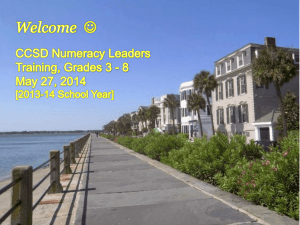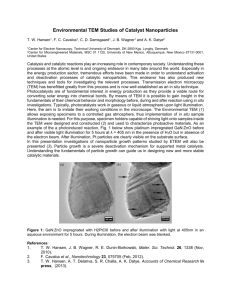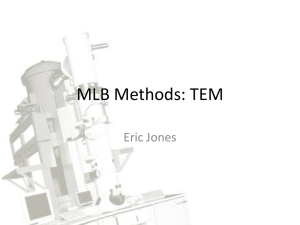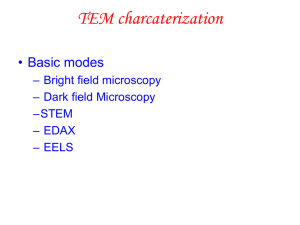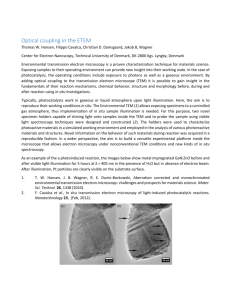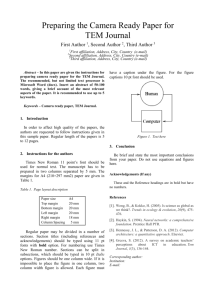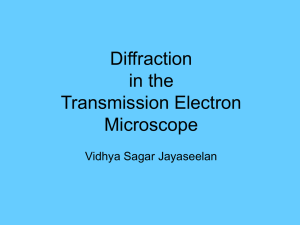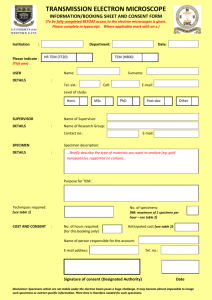Peter A Eschbach - Oregon State University
advertisement
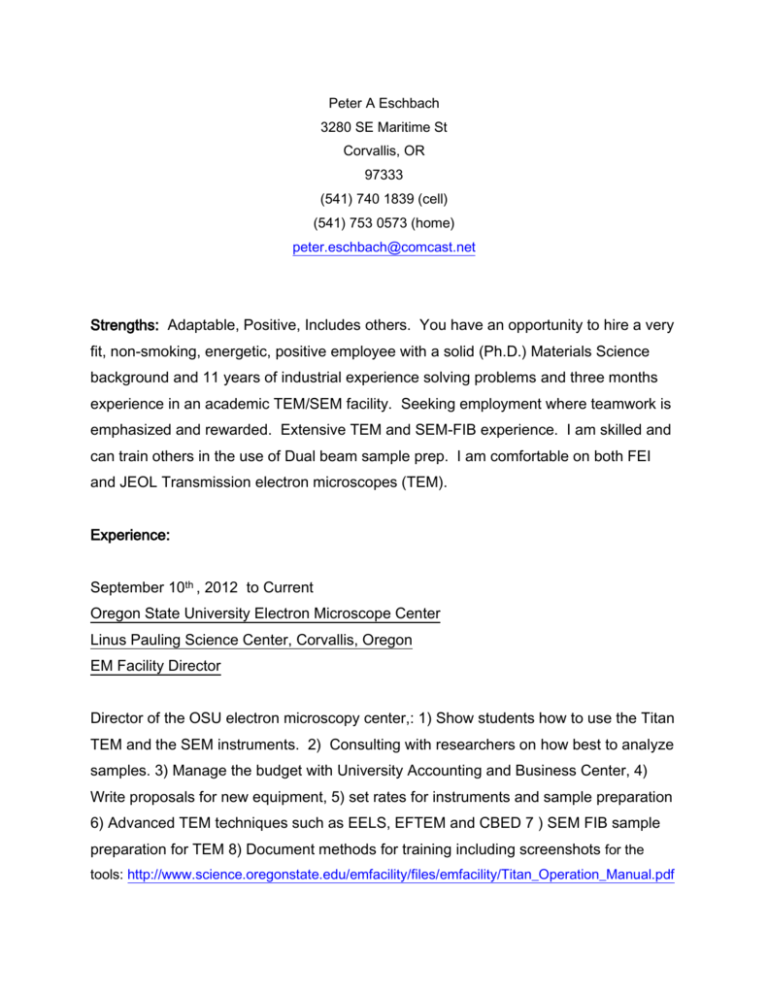
Peter A Eschbach 3280 SE Maritime St Corvallis, OR 97333 (541) 740 1839 (cell) (541) 753 0573 (home) peter.eschbach@comcast.net Strengths: Adaptable, Positive, Includes others. You have an opportunity to hire a very fit, non-smoking, energetic, positive employee with a solid (Ph.D.) Materials Science background and 11 years of industrial experience solving problems and three months experience in an academic TEM/SEM facility. Seeking employment where teamwork is emphasized and rewarded. Extensive TEM and SEM-FIB experience. I am skilled and can train others in the use of Dual beam sample prep. I am comfortable on both FEI and JEOL Transmission electron microscopes (TEM). Experience: September 10th , 2012 to Current Oregon State University Electron Microscope Center Linus Pauling Science Center, Corvallis, Oregon EM Facility Director Director of the OSU electron microscopy center,: 1) Show students how to use the Titan TEM and the SEM instruments. 2) Consulting with researchers on how best to analyze samples. 3) Manage the budget with University Accounting and Business Center, 4) Write proposals for new equipment, 5) set rates for instruments and sample preparation 6) Advanced TEM techniques such as EELS, EFTEM and CBED 7 ) SEM FIB sample preparation for TEM 8) Document methods for training including screenshots for the tools: http://www.science.oregonstate.edu/emfacility/files/emfacility/Titan_Operation_Manual.pdf August 2008-July 20th, 2012 Hewlett Packard Corporation, Corvallis Oregon TEM and SEM Engineer in the Imaging and Printing Group at HP I was the lead Engineer of the transmission electron microscopy group and the nanoindentation laboratory. In these roles I participated in many task forces to solve materials problems. Weekly updates were prepared and presented to management on hot jobs, from HP sites around the world. Expertise includes Dual beam FIB, TEM sample preparation using a dual beam FIB; both InLO and ExLO. Excellent at working in pressure situations with one of a kind samples. Excellent hand eye coordination as needed in TEM lift out. Expertise in TEM includes imaging, STEM EDS, EFTEM, HAADF and EELS. Also very strong in the use of image processing tools such as Digital Micrograph and Matlab. Fluent in Matlab and have written my own algorithms for EELS analysis using Matlab. Leader of the TEM team and SEM team in Corvallis: participate in workflow streamlining, purchase of multi million dollar instruments, and input for staff development. August 14, 2001 to August 2008 Hewlett Packard Corporation, Corvallis Oregon Failure Analysis Engineer in the Imaging and Printing Group at HP As a failure analysis engineer analysis plans were created, failed parts were gathered then inspected on optical microscopes and SEM. The parts were then sent to various analytical labs within HP Corvallis for chemical, thermal and mechanical analysis to find the root cause of the failure. Was also a key member of many task forces that were formed to solve large, multi-million dollar issues. February 1995-August 11, 2001 Pacific Northwest National Laboratory operated by Battelle, Richland, Washington Senior Research Scientist (grade IV) in Sensors and Measurements Systems Group In conjunction with a lead engineer, sensor systems for industry were developed. These included a proximity sensor for endoscopes used in eye surgery, a paper thickness gauge for the pulp and paper industry, and a series of algorithms using chemometrics to characterize automobile emissions. A proficiency in the following tools was acquired: infra-red spectroscopy, Auger electron spectroscopy, XRD, and white light interferometery. Became very proficient in Macintosh, Unix and Wintel based operating systems. February 1990-February 1995 Pacific Northwest National Laboratory operated by Battelle, Richland, Washington Research Scientist in the Health Physics department Applied research in solid state dossimetry was performed. Developed laser and optical systems to optimally stimulate and collect light from solid dossimetric materials. A water quality sensor was developed in conjunction with Instrumentation Northwest, a private company based in Redmond, WA. Proficiency with high power, CW, lasers and many optical techniques was developed in these five years. Education: Ph.D. in Materials Science, Washington State University, May of 2001 Thesis title: The Role of Buffer Layers in Copper Indium di Selenide solar cells. Investigated the interface of ZnO/copper indium diselenide solar (CIS) cells using XPS, IV analysis vs. temperature, photoresponse, and the Seeback effect. P type CIS with and without CdS buffer layers were received from partners and various layers were added to complete the devices. Full characterization was completed by author. This included using an Auger electron spectrometer at Battelle, Pacific Northwest National Laboratory. It was discovered that Cd and Zn diffusion were causing diminished photocurrent in the devices. Computer models of the devices were constructed using PC-1D to simulate the effect of extended interfaces caused by Cd and Zn diffusion into the bulk CIS. Masters degree in Physics, Washington State University, December of 1989 Thesis was completed on laser-solid interactions probed with plasma physics spectroscopy and mass spectroscopy. The chemistry of silicate glasses with various alkali groups was studied in an attempt to better explain the laser ablation process. Masters degree in Atmospheric Science, University of California at Los Angeles, June of 1987 On a Ford Foundation Fellowship. A project was completed for masters degree. Project focused on magnetic fields and charged particle trajectories in the region between the sun and earth. Satellite data was gathered at JPL and analyzed at UCLA. Bachelor of Science in Physics, Washington State University, May of 1985 Cum Laude. Graduate classes in Mathematical Physics, Nuclear Physics and Solid State Physics were taken. Undergraduate research was completed in shock wave physics. Liquids were shocked to half their original volume and the uv-visible spectra of the liquids acquired while shock waves past through the liquids. Was an employee of the shock physics group and studied under the mentorship of the late Dr. George Duvall. Simple X-T and P-V diagrams were created for Dr. Duvall using data from Bridgman’s text on High Pressure Physics and the use of the Rankine-Hugonoit jump conditions. Publications: Anatomy of a Nanoscale Conduction Channel Reveals the Mechanism of High Performance Memresistor F. Miao, J.P. Strachan, J.J. Yang, M.X. Zhang, I Goldfarb, A.C. Torrezan, Peter Eschbach, Rondal D. Kelley, G.M. Riberio, R.S. Williams Advanced Materials, Vol 23, Issue 47, Dec 15 2011, pp 5633-5640 Role of Buffer Layers in CIS-Based Solar Cells, L.C. Olsen, Peter Eschbach et. Al. The 29th IEEE Photovoltaics Specialists Conference, May 19-24, 2002, New Orleans, Louisiana. Effects of Buffer Layes on CIGSS Cell Performance, LC Olsen, PA Eschbach et. al. http://www.nrel.gov/ncpv_prm/pdfs/papers/105.pdf Solar Program Review Meeting, NREL, Denver Colorado, May of 2001 The Role of Buffer Layers in Copper Indium Gallium Selenium Sulfur Solar Cells, PhD. Thesis, Department of Materials Science, Washington State University, May 12, 2001. Genetic Algorithm vs. Stepwise Regression for Variable Selection in One Calibration Application, Peter Eschbach, Kirk Remund, and Barry Wise. Newsletter of The North American Chapter of the International Chemometrics Society, 13, Sept. of 1996; pp 3-8. A Gamma-Ray Discriminating Neutron Scintillator, P.A. Eschbach, S.D. Miller, M.C. Cole and N.R. Gordon, Radioactivity and Radiochemistry, 5, 1, 1994, pp 40-45. A Gamma/Neutron Discriminating, Cooled, Optically Stimulated Luminescence (COSL) Dosemeter, P.A. Eschbach and S. D. Miller, Radiation Protection Dosimetry, 47, 1/4, (1993), pp 289-292. Consequences of Simultaneous Exposure of Inorganic Solids to Excimer Laser Light and Electron Beam, J.T. Dickinson, S.C. Langford, L.C. Jensen, P.A Eschbach, L.R. Pederson, D.R. Baer, J. Applied Physics, 68, 4, (1990), pp. 1831-1836 The Interaction of Ultraviolet Excimer Laser Light with Sodium Trisilicate, P.A. Eschbach, J.T. Dickinson, S.C. Langford, and L.R. Pederson, J. Vac. Sci, Technol. A 7 (5), Sep/Oct 1989, pp. 2943-2951. References: Heather Paris, 7805 NW Hope Drive Corvallis Oregon Dr. William Stickle, SW Grand Oaks Drive, Corvallis, Oregon Dr. Peter Mardilovich, Corvallis Oregon Committees: Technical Advisory Group (TAG) to ANSI on TEM measurements of nanoparticles.
